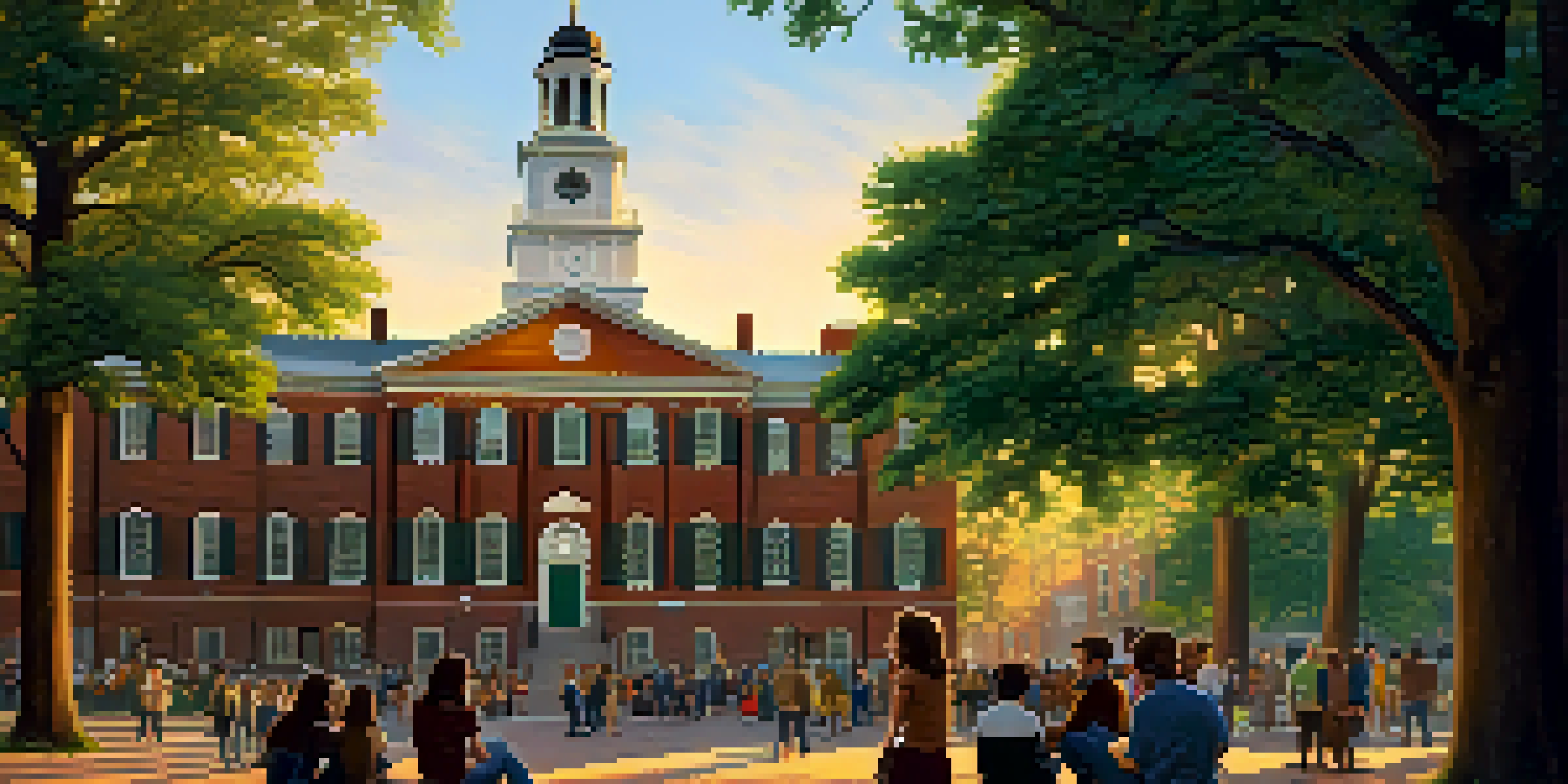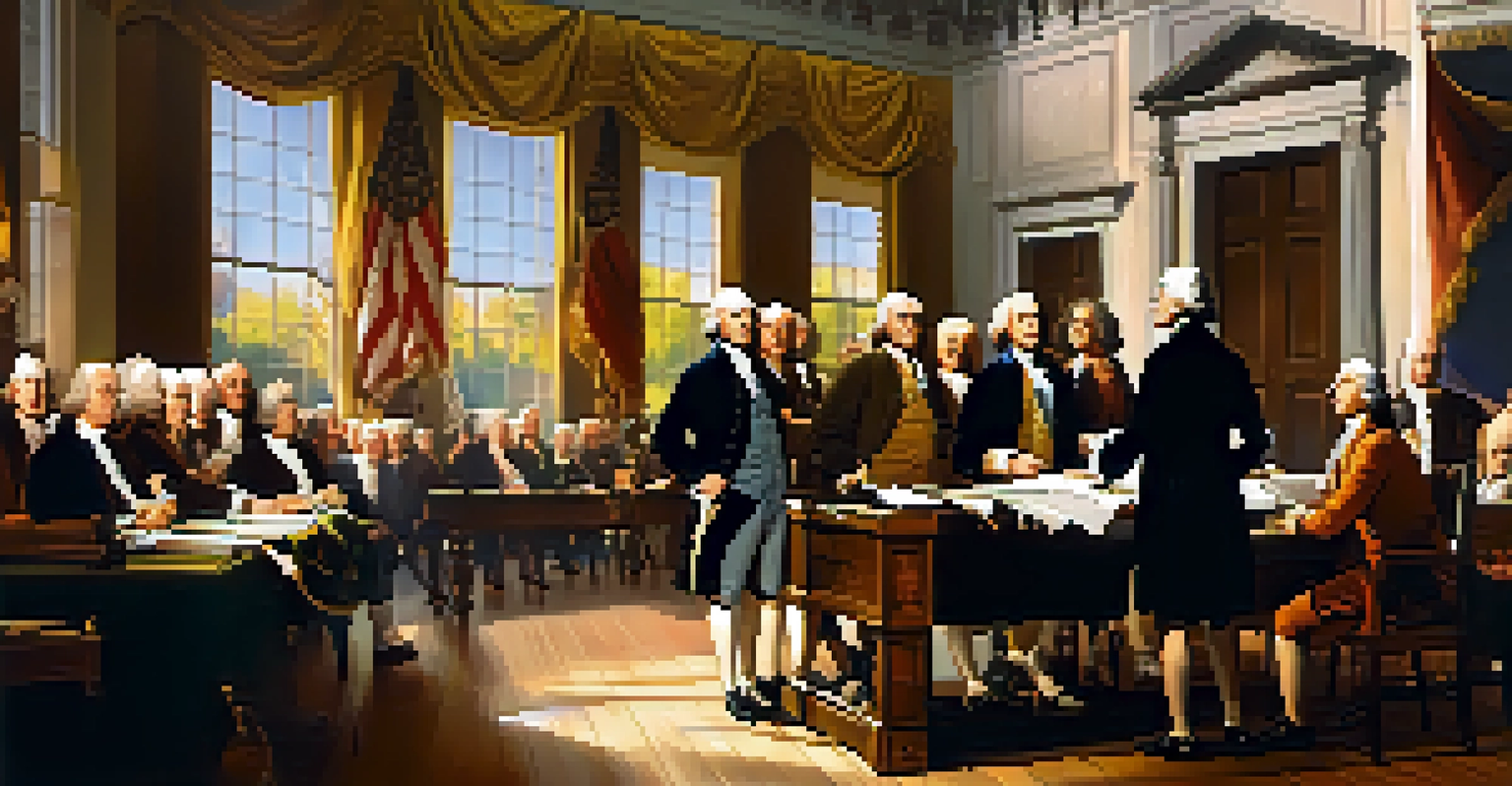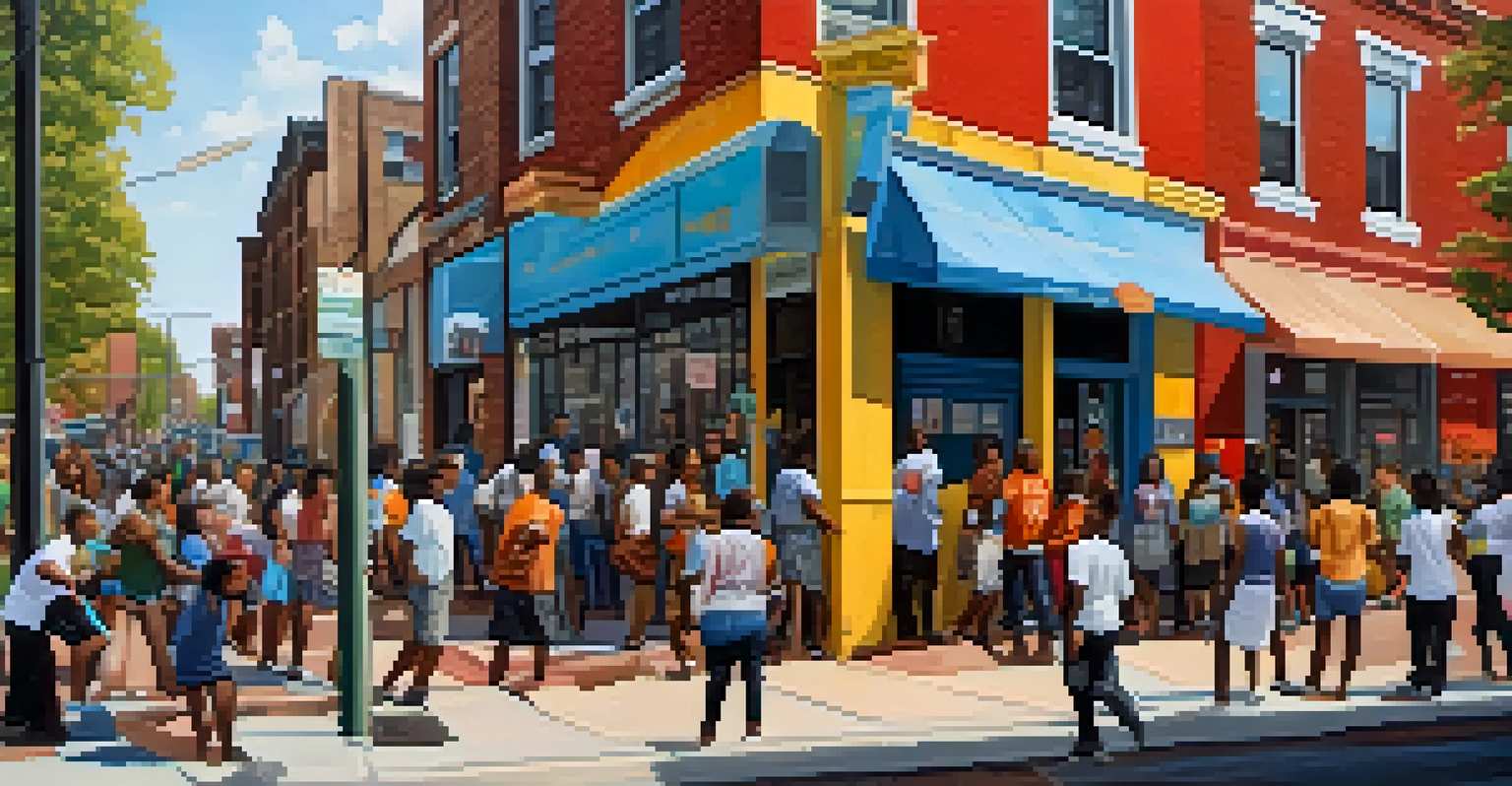Philadelphia: A Hub of Revolutionary Ideas and Actions

The Historical Significance of Philadelphia
Philadelphia, often called the birthplace of America, played a crucial role in the founding of the nation. Established in 1682 by William Penn, it became a bustling hub for trade, culture, and politics. By the mid-18th century, it was the largest city in the American colonies, making it a natural gathering place for revolutionary thinkers and activists.
The people of Philadelphia have always believed that ideas matter, that they can shape the world.
The city was not just a backdrop for events; it was a vibrant stage where ideas flourished. The assortment of intellectuals, merchants, and ordinary citizens contributed to a lively discourse about freedom and governance. This melting pot of perspectives helped ignite the revolutionary spirit that would eventually lead to independence.
As the site of both the First and Second Continental Congresses, Philadelphia became synonymous with the struggle for democracy. The debates and decisions made within its walls set the tone for a nation seeking liberty and justice, proving that the city was more than just a location; it was an idea in action.
The Declaration of Independence: A Radical Idea
In 1776, Philadelphia was the backdrop for one of the most pivotal documents in history: the Declaration of Independence. Drafted primarily by Thomas Jefferson, this document boldly articulated the colonies' desire for freedom from British rule. The very act of declaring independence was revolutionary, challenging the status quo and inspiring colonists to envision a new future.

This declaration was not just a political statement; it was a profound expression of human rights. The famous phrase 'life, liberty, and the pursuit of happiness' resonated deeply, capturing the essence of the revolutionary movement. It transformed abstract ideals into tangible goals, encouraging citizens to stand up for their rights.
Philadelphia: Birthplace of Democracy
The city played a pivotal role in American history, serving as the site for the Declaration of Independence and the Constitutional Convention.
The signing of the Declaration on July 4, 1776, in Philadelphia marked a defining moment in American history. It united the colonies in a common cause and laid the groundwork for a new nation, proving that ideas—when shared and believed in—can lead to monumental change.
The Constitutional Convention: Crafting a New Government
Just over a decade later, in 1787, Philadelphia once again became the epicenter of revolutionary thought during the Constitutional Convention. Delegates from various states gathered to address the weaknesses of the Articles of Confederation and to draft a new framework for government. This meeting represented a pivotal moment in which the future of the nation was debated and shaped.
In the end, we will remember not the words of our enemies, but the silence of our friends.
The discussions were heated and often contentious, reflecting the diverse opinions on governance and representation. Key figures like James Madison and Alexander Hamilton emerged, advocating for a stronger federal government while ensuring individual liberties would be protected. Their collaboration and compromise were essential in creating a balanced system that could endure.
The result was the United States Constitution, a groundbreaking document that established the rule of law and the principles of democracy. Philadelphia's role in this process showcased its significance as a breeding ground for revolutionary ideas, demonstrating that collaboration can lead to innovative solutions in the face of complex challenges.
Philadelphia's Role in Abolition and Civil Rights
Philadelphia has a rich history in the fight against slavery and for civil rights. In the early 19th century, the city became a key player in the abolitionist movement, with figures like Lucretia Mott and William Lloyd Garrison advocating for the end of slavery. Their efforts were instrumental in raising awareness and mobilizing support for this critical cause.
The Pennsylvania Abolition Society, founded in 1775, was one of the first organizations dedicated to ending slavery. Philadelphia's diverse population provided a fertile ground for activism, allowing different voices to unite in the pursuit of equality. This spirit of cooperation was a hallmark of the city’s revolutionary ethos.
Abolition and Civil Rights Movement
Philadelphia emerged as a key player in the abolitionist movement and continued to advocate for civil rights throughout its history.
As the nation grappled with the issues of race and equality, Philadelphia remained at the forefront of the civil rights movement. Its history reflects a continuous struggle for justice, demonstrating how revolutionary ideas can evolve and adapt to address new challenges.
Cultural Revolution: The Arts and Literature in Philadelphia
Philadelphia's revolutionary spirit extended beyond politics into the realms of art and literature. The city has long been a hub for creative minds who challenged societal norms through their work. From the writings of Edgar Allan Poe to the art of Thomas Eakins, Philadelphia nurtured creativity that often mirrored the revolutionary ideas of its time.
The Philadelphia Museum of Art, established in 1876, became a symbol of the city’s commitment to cultural growth. It showcased not only local artists but also those who pushed boundaries and explored new ideas. This dedication to the arts allowed Philadelphia to foster an environment where revolutionary thoughts could be expressed creatively.
Moreover, literary salons and artistic communities in Philadelphia often served as incubators for social change. These gatherings provided a platform for discussion and collaboration, proving that the arts can be a powerful vehicle for advancing revolutionary ideas and inspiring future generations.
Modern Revolution: Philadelphia Today
Today, Philadelphia continues to embody the spirit of revolution, adapting to contemporary challenges while honoring its rich history. The city is a melting pot of cultures, ideas, and movements, with various grassroots organizations advocating for social justice, economic equality, and environmental sustainability. This active engagement reflects the same revolutionary spirit that characterized its past.
Philadelphia's diverse neighborhoods serve as examples of how community activism can lead to meaningful change. From initiatives aimed at reducing poverty to efforts promoting education and healthcare equity, the city’s residents are committed to building a better future. This ongoing revolution highlights the importance of local action in shaping broader societal change.
Cultural Hub of Revolutionary Ideas
The city's commitment to the arts has fostered an environment where revolutionary thoughts and social change continue to thrive.
Moreover, Philadelphia's role as a cultural and educational hub ensures that revolutionary ideas continue to flourish. Institutions like the University of Pennsylvania and the Philadelphia Museum of Art play a vital role in fostering innovation and dialogue, bridging the gap between history and the future.
Touring Revolutionary Philadelphia: A Path Through History
For those looking to explore Philadelphia's rich revolutionary history, the city offers a myriad of historical sites and tours. The Liberty Bell and Independence Hall stand as iconic symbols of American freedom, drawing visitors from around the globe. These landmarks provide a tangible connection to the revolutionary past, allowing people to walk in the footsteps of those who fought for independence.
Beyond the well-known sites, Philadelphia also boasts lesser-known gems that tell the stories of local heroes and movements. Walking tours can reveal the hidden corners of the city where pivotal events took place, offering a deeper understanding of its revolutionary legacy. Engaging with local historians can add layers of context that enrich the experience.

Visiting Philadelphia is not just about witnessing history; it's about understanding the ongoing impact of those revolutionary ideas. As you stroll through the streets, you can't help but feel the echoes of the past, reminding us that the spirit of revolution is very much alive and continues to shape the present.